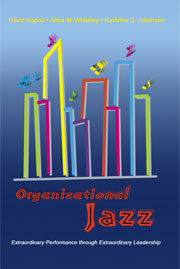Last week I finished reading the really interesting book ‘Organizational Jazz – Extraordinary Performance through Extraordinary Leadership’ (David Napoli, Alma Whiteley, Kathrine Johansen) which I borrowed from Steve Leybourne from Boston University. It describes in a passioned way how most managers try to hang on to the myth of a certain and predictable world, but that we have to transform our way of working to create sustainable organizations. What do we do when our environment is close to chaos? We dance.
‘Constant, rapid and unpredictable changes, both internal and external, are challenging the time-honoured business models we are taught to follow – as we strive to manage our complex, evolving organizations.Drawing on the science of complex adaptive systems, this book offers a lens through which we search for new ways of thinking about, and working with, the unpredictability of our dynamic complex world.Organizations of today need ‘Extraordinary Leaders’ who can ‘dance’ with change by embracing the principles of complexity science to create highly adaptable and innovative organizations that recognise the value of intangible assets.The success of an organization usually depends on those working closest to the value-adding end of the business. It is those employees and their immediate leaders, who seem to have the greatest impact on the success of an organization. Managers-as-leaders can ease the way for those who depend on them for support and encouragement.’
Interesting issues mentioned are:
- Mechanistic Leadership (certain environment) vs Extraordinary Leadership (uncertain environment).
- Value Driven Organizations (opportunity and empowerment), in stead of depending on rules that limit people. Which is really strange if you think of it…
- The movement from Ego to Eco (picture from earlier post) to cope with complexity. There is sometimes a narcissistic tendency in our Western culture to love great leaders, and to underestimate great teams. So try to create Teams which act as a magnet, in stead of a classroom with a teacher with students who wait for the lunch break.
- Embracing complexity, in stead of trying to control it with strategic planning and control. People can cope with complexity as long as they dance with it and not try to make it what they expected it to be (older post on improvisation). Readers who have children will probably recognize this.
- Being highly adaptive and innovative to become a sustainable organization.
 I found it is really worthwhile to read this book, and can advise it to anybody whose interested in dealing with complexity, innovation, value driven organizations, and improvisation. You can read the first 128 pages (which were the most interesting…) on this google books site.
I found it is really worthwhile to read this book, and can advise it to anybody whose interested in dealing with complexity, innovation, value driven organizations, and improvisation. You can read the first 128 pages (which were the most interesting…) on this google books site.
David Napoli, Alma M. Whiteley and Kathrine S. Johansen
ISBN 978-0-9757710-6-8